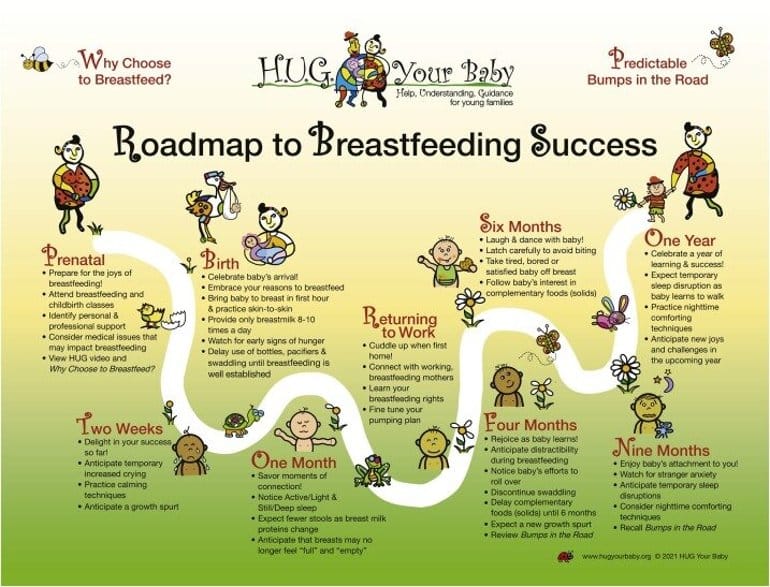Summary: Expectant mothers who took a two-hour perinatal course called “Help, Understanding, Guidance (HUG) Your Baby” had a significantly reduced risk of postpartum depression and an increase in parental confidence once their baby arrived.
Source: Hiroshima University
Knowledge may be even more powerful than the adage implies: It could help reduce postpartum depression in mothers, according to researchers in Japan. Postpartum depression is on the rise in Japan, especially as the cultural norm of traditional support systems comprising grandparents and other relatives shift to more contained, nuclear groups, especially in more urban areas.
“Mothers in urban Japan are at a high risk for postpartum depression,” said Yoko Shimpuku, professor in the Graduate School of Biomedical and Health Sciences at Hiroshima University. “We found that a two-hour course, called Help, Understanding, Guidance (HUG) Your Baby, significantly reduced that risk and increased parental confidence.”
Shimpuku and the multi-institutional team’s study results, originally made available online in December of 2021, were published in the November 2022 issue of Women and Birth.
“In Japan, as in other countries, it often is the responsibility of midwives to educate both mothers and their partners about infant behavior and parenting, so that both can parent with confidence,” Shimpuku said, noting that Japan’s Ministry of Health, Labor and Welfare recently reported that while mothers in Japan parent about seven and a half hours a day, fathers only parent about an hour per day.
This is the lowest rate among developed countries. “Understanding a baby’s behavior has been shown by previous studies to increase parenting confidence, maternal self-efficacy and father’s participation in parenting—and enhance parent-infant interaction, infant development and breastfeeding duration.”
The HUG Your Baby program was developed by Jan Tedder, a family nurse practitioner and lactation consultant in the United States, to help parents understand their baby’s behavior and is currently in use around the world. Shimpuku and co-author Mariko Iida, of Yokohama City University, translated the program into Japanese and introduced it to health care providers and university midwifery students in 2013.
Since then, Shimpuku said, it has been well-received by clinicians and mothers alike, but it has not been rigorously assessed beyond perception.
“In this study, we examined whether differences might be found, using standardized measures of maternal psychology, between mothers who received HUG Your Baby teaching and mothers who did not,” Shimpuku said. “We found that the program, administered prenatally, has positive effects on preventing postpartum depression and increasing parenting confidence.”
More than 220 women were recruited to the study between February 2015 and February 2016, split by timing to avoid cross-contamination between the control and intervention groups.
The control group received regular prenatal treatment and a leaflet with some more information, while the intervention group participated in a two-hour course consisting of a lecture about how to recognize and respond to a baby’s behavior—including sleep-wake cycles—and hands-on learning with a doll. The intervention group also received information about breastfeeding.
“Participants completed standardized scales on postnatal depression and parenting confidence, as well as answered questions demonstrating knowledge of baby’s behavior at one and three months postpartum,” Shimpuku said.

The participants’ scores in both groups at one month indicated that they were at a higher risk for postpartum depression than a national survey, but the intervention’s group was lower than the control’s score. “It can be said that the HUG Your Baby intervention decreased maternal depression in high-risk mothers living in urban Japan.”
The intervention group also had more confidence at one month, which persisted at three months, at which point the control group caught up. This is particularly interesting, according to Shimpuku, since the intervention group had more first-time mothers as pregnant women who already had children were less likely to have the time to attend the course.
“Though ‘live’ classroom teaching, as utilized in the present study, enhances social connections and promotes hands-on learning, the COVID-19 pandemic caused HUG Your Baby to broaden its outreach efforts beyond face-to-face encounters,” Shimpuku said.
“The growing research base for this program suggests that it should be continued, expanded (perhaps with a greater virtual component) and more closely studied by other researchers to better understand and develop its proven potential to increase positive parenting experiences, both in Japan and elsewhere in the world.”
About this parenting research news
Author: Press Office
Source: Hiroshima University
Contact: Press Office – Hiroshima University
Image: The image is credited to the researchers
Original Research: Open access.
“Prenatal education program decreases postpartum depression and increases maternal confidence: A longitudinal quasi-experimental study in urban Japan” by Yoko Shimpuku et al. Women and Birth
Abstract
Prenatal education program decreases postpartum depression and increases maternal confidence: A longitudinal quasi-experimental study in urban Japan
Background
Mothers in urban Japan are at high risk for postpartum depression. Previous research indicates that parents who understand their baby’s behavior may have lower risks for postpartum depression. HUG Your Baby helps parents understand their baby’s behavior.
Aim
The purpose of this longitudinal study was to determine whether mothers receiving prenatal HUG Your Baby teaching would have better outcomes than a control group with respect to postpartum depression and related factors.
Methods
Pregnant women, after thirty weeks’ gestation, were recruited to either the intervention or the control group. The intervention group received HUG Your Baby education, which teaches how to recognize and respond to a baby’s behavior. The control group received a leaflet and regular, prenatal treatment. Participants completed the Edinburgh Postnatal Depression Scale, Karitane Parenting Confidence Scale, and three other scales at one and three months, postpartum. Questions about knowledge of baby’s behavior was administered prenatally, and at one and three months, postpartum.
Findings
Data derived from 221 mothers (Control 100, Intervention 121) were included in the analysis. Researchers found significant differences regarding postpartum depression at one and three months and parenting confidence at one month. Scores were favorable for the intervention group.
Conclusions
The HUG Your Baby program has a positive impact on preventing postpartum depression and increasing parenting confidence. It warrants wider implementation and evaluation in prenatal programs.






